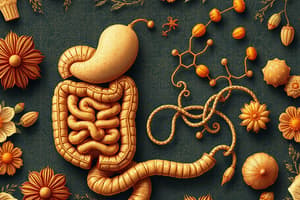Podcast
Questions and Answers
What is the primary function of salivary amylase in the mouth?
What is the primary function of salivary amylase in the mouth?
- Store food for later digestion
- Break down proteins into peptides
- Break down carbohydrates into shorter-chain sugars (correct)
- Absorb nutrients into the bloodstream
What is the optimal pH range for salivary amylase activity?
What is the optimal pH range for salivary amylase activity?
- 8.5-9.5
- 7.5-8.5
- 4.5-5.5
- 6.7-7.3 (correct)
What is the consequence of incomplete digestion in the mouth?
What is the consequence of incomplete digestion in the mouth?
- Impaired carbohydrate absorption in the small intestine (correct)
- Reduced saliva production
- Enhanced carbohydrate absorption in the small intestine
- Increased salivary amylase production
Why is mouth digestion limited?
Why is mouth digestion limited?
What is the primary site of carbohydrate digestion?
What is the primary site of carbohydrate digestion?
What is the product of salivary amylase action on carbohydrates?
What is the product of salivary amylase action on carbohydrates?
Flashcards are hidden until you start studying
Study Notes
Mouth Digestion
Mechanism of Carbohydrate Digestion in the Mouth
- Carbohydrate digestion begins in the mouth with the action of salivary amylase, an enzyme produced by the salivary glands.
- Salivary amylase breaks down carbohydrates, such as starches, into shorter-chain sugars, including maltose and dextrins.
Action of Salivary Amylase
- Salivary amylase acts on α-1,4-glycosidic bonds, hydrolyzing them to produce maltose and dextrins.
- The optimal pH for salivary amylase activity is 6.7-7.3, which is the normal pH range of the mouth.
Importance of Mouth Digestion
- Mouth digestion is important for breaking down carbohydrates into smaller molecules, making them more accessible to digestive enzymes in the small intestine.
- Incomplete digestion in the mouth can lead to impaired carbohydrate absorption in the small intestine.
Limitations of Mouth Digestion
- Mouth digestion is limited by the short time food spends in the mouth and the relatively small amount of salivary amylase present.
- As a result, only a small portion of carbohydrates are digested in the mouth, with the majority of digestion occurring in the small intestine.
Studying That Suits You
Use AI to generate personalized quizzes and flashcards to suit your learning preferences.




